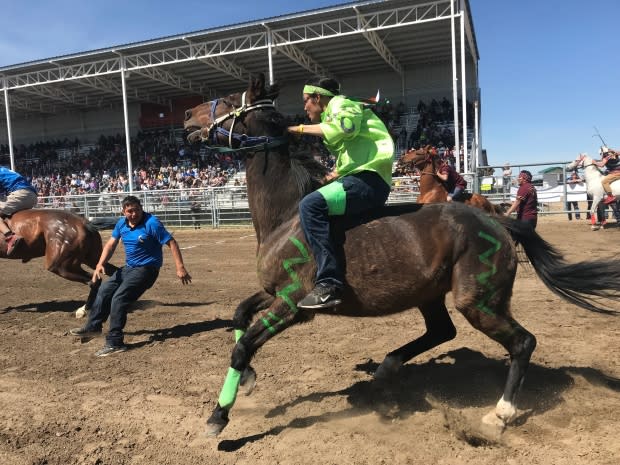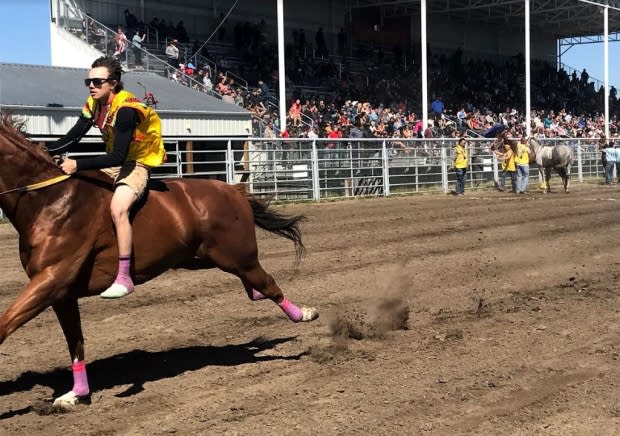'The most exciting sport you'll ever see': Indian relay takes off in northern Alberta
Thousands of fans watched in awe as daredevil riders raced in the inaugural Indian relay at Bonnyville's rodeo grounds over the May long weekend.
Twenty-two teams from across Canada and the U.S. came out for the event — all of them vying for the $20,000 top prize.
Kehewin Cree Nation, a community 25 kilometres south of the northern Alberta town, hosted the two-day race event.
A sport with long tradition, it's one that is new to many First Nations peoples in Canada.
Indian relay, as it's referred to by racers, has grown significantly since being popularized in Canada in 2017.
The Kehewin team started up this year.
"The horse is bringing us together," said the Bonnyville relay organizer Ben Badger.
"There's a connection when you're on that horse, there's an indescribable feeling when nothing else really matters. As long as you're in tune with that horse, that horse will take care of you."
The formula for the centuries-old Indigenous extreme sport is simple: one rider, three fast horses, and three laps.
Each relay team has one rider, and three other relay team members help control the horses at the start line.
The rider races bareback on thoroughbred horses, and jumps from one horse to the next in each lap around a track. In total, the single rider does two transfers to three different horses in three laps. First to past the finish line, wins.
That doesn't always go as planned.
A horse can become dazed, running well past the finish line without stopping. Or worse, it could stop short of the white line at the beginning of the track, mistaking it for a barrier. Transferring from one horse to another doesn't always go smoothly either.
The thoroughbreds can run in the wrong direction, making the team fall behind in the race. Or riders can miss their mark leaping on the animal's back and fall off.
But the event was about more than just sport. It was about reconciliation and healing for a new generation.
"All the teams out here from Alberta and Saskatchewan. We're pretty close. It's like one big relay family," said Tyree Badger said, a Kehewin Cree Nation team rider.

The relay in Bonnyville was only his second race.
"I'd rather be out there than at home."
Even though the Kehewin Cree Nation team finished last in their heat, simply staying on the horse was a victory enough for the 18-year-old.
"It keeps me out of trouble a lot. It keeps me on a good path there," he said.
'Poetry in Motion'
"It's the most exciting sport you'll ever see," said Ervin Carlson, an American third-generation Indian relay competitor turned coach.
Carlson has been at it for years, but he said he still gets jitters every time he steps out onto the track.
He heads the Blackfeet Nation's Carlson Relay team. Together they made an eight-hour drive from Browning, Montana.
It was worth the trip: The team won the first place cash prize — with a 25 teepee pole lead over the runner-up.
The sport runs in the Carlson family.
Carlson's grandfather John DeRoche, started racing in 1940s, and his sons now race in the winning team.
A second team that also competed over the weekend, had his nephew on it as well.
And Carlson said he is already training his grandkids to take over the tradition.
The seamless last exchange for the Carlson Relay team sealed their fate as champions.
As the rider hopped onto a grey thoroughbred — the team's final horse — and the horse's hooves kicked up the dirt on the track, their nearest competitors were quickly left in the dust.
"It's like poetry in motion," shouted the play-by-play commentator, Earl Wood over the loudspeaker. And the Carlson Relay bolted around the ring to a smooth victory.
"It's a good feeling when you get those real nice exchanges and you're on and your gone," Carlson said about his relay team's winning race.
The sport isn't just about a prize for the team.
Travelling around from event to event is also about bringing back culture that has been lost.
"The Blackfeet Nation, we're a real horse culture. We've always been horse people," Carlson said. "Relay kind of went away for a while, but it came back."
"It coming back is a big part of our culture because a lot of things in our culture that have been gone for a while," Carlson said, still glowing with pride after his team's win. "So it's a real good feeling to have that culture come back into us."

As of this year, the Indian Relay will now have a permanent place at the greatest outdoor show on earth: The Calgary Stampede.
The Carlson Relay is one of the invited teams set to compete this year.
After winning at last year's race, the Blackfeet team will be training hard to win the top prize of $100,000 again this year.
